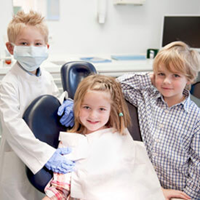what is a tooth extraction?
Dr. Luke Riley always makes every attempt to conserve and maintain your natural teeth; however, there are sometimes instances in which one or more teeth might have to be taken out. A simple extraction takes out a tooth that's visible over the gums. This is normally done for a tooth that's decayed or damaged and cannot be repaired. A surgical extraction takes out a tooth that hasn't erupted over the gums. Surgical extractions are frequently performed to take out impacted teeth, like the wisdom teeth, that don't have sufficient space to fit into your mouth. No matter the reason for having an extraction, our staff will give you the best treatment at Riley Dental. Our Haslet, TX dental practice provides level-1 nitrous oxide sedation, and any other anesthesia is only delivered after the use of a topical numbing agent. This means you won't even feel the initial poke of the injection and can stay comfortable and calm throughout your treatment. Get in touch with our staff to learn more or to schedule an assessment with Dr. Riley to boost your smile.
Reviews
What Are the Benefits of Tooth Extractions?
Simple and surgical tooth extractions conducted at Riley Dental in Haslet, TX enable area men and women to address oral health issues with one or more teeth that could become severe problems and harm the rest of the mouth if left untreated. Functional and aesthetic benefits of tooth extractions performed by Dr. Luke Riley and his team may include:
- Stopping wisdom teeth or additional impacted teeth from harming oral health any further
- Enabling the growth of permanent teeth in younger children
- Allowing the placement of orthodontics
- Averting long-term issues from tooth decay or infection
- Treating tooth conditions that may result from high-impact trauma like car accidents or sports injuries
- Avoiding infections from partially impacted or erupted teeth
When do you need a tooth extraction?
If your tooth is broken or damaged by decay, Dr. Riley will make every attempt to fix it using a crown, bonding, or filling. However, there are times when a tooth might have too much decay or has cracked and will have to be removed to prevent the damage from spreading. Sometimes removing one bad tooth is necessary to conserve the health of the rest of the teeth. Infection from teeth can spread to many other areas of the body, including the heart, pancreas, stomach, and brain and cause serious health complications. You could also require an extraction of a tooth or teeth that can't fit in your mouth. This involves your third molars, popularly called wisdom teeth, which grow in around ages 17 – 21. In older kids, infant teeth that haven't naturally fallen out might have to be extracted so that they do not obstruct the emergence or discolor the permanent teeth as they come in. If you're getting orthodontics or contemplating Invisalign, you might require an extraction to make space for the remaining teeth when they move into their normal places.
how is a tooth extraction performed?
Dental extractions are done in our office using local anesthesia on the area near the tooth being treated. Nitrous oxide or other sedation methods might be used based on the degree of complexity of the extraction and also to help you stay relaxed in case you have some dental anxieties. Remember, treating you comfortably is always one of Dr. Riley's top priorities! As soon as you're prepared, Dr. Riley will start the procedure. To complete a simple extraction, Dr. Riley will loosen up the tooth using a special device called an elevator and then gently lift the tooth from the socket. A surgical extraction entails making incisions into your gums to get access to the tooth. If necessary, the tooth might be broken up into smaller pieces so that it can be taken out. When the tooth has been removed, Dr. Riley may place sutures in the gums to help the area heal. If you are interested in obtaining an implant after removal or if you have some bleeding concerns, Dr. Riley might recommend doing a socket preservation in order to maintain the strength and size of bone where the tooth was removed and prevent healing complications. Dr. Riley may prescribe antibiotics for you to be taken either before or after the procedure. Sometimes this is necessary if you have a chronic illness, if the level of infection is exceptionally high, if your immune system is compromised, or if you have an artificial joint or heart valve.
how long is recovery after a tooth extraction?
As your gums heal, you need to avoid any form of tobacco and nicotine, including vaping as well using straws. Your recovery will vary based on the level of complexity of your dental extraction; however, many patients choose to eat soft, room-temperature food for at least a couple of days following the procedure. Dr. Riley will speak with you regarding what to expect in your specific case as you recover and the best ways to look after your gums and jaw. Your gums will probably be inflamed after the procedure; therefore, Dr. Riley suggests over-the-counter pain medicine and cold compresses. Dr. Riley may give you a written prescription for pain medicine and/or antibiotics. Besides some proposed follow-up visits, you should schedule regular appointments at Riley Dental for dental examinations and cleanings so Dr. Riley can track your dental health following an extraction.
does insurance cover tooth extractions?
An extraction is generally covered by dental insurance, but your sedation option may not be completely covered. Prior to your extraction, we'll call your insurance provider to ascertain your particular policy and estimate your out-of-pocket expenses. If you do not have dental insurance, we can discuss the numerous payment types we take as well as information about third-party medical financing via CareCredit.
Tooth Extractions FAQ
Do tooth extractions hurt?
Tooth extractions generally don't hurt, but you may experience some discomfort during and after the procedure. The level of pain you feel will depend on a few factors, including the type of extraction being performed and your own personal pain tolerance. If you're concerned about pain, discuss your concerns with Dr. Riley.
How should I prepare for a tooth extraction?
Before your extraction at Riley Dental, you must brush and floss your teeth thoroughly. Although we will clean your teeth before the procedure, it's important to remove as much plaque and bacteria as possible to help reduce your risk of infection. Dr. Riley also recommends staying hydrated and getting plenty of rest the night before.
What steps can I take to ensure my gums heal correctly?
Ice packs can help reduce inflamed or swollen gums following an extraction. Saline water can be used to rinse the gums, and adhering to a soft food or liquid diet may further help the healing process along. Additionally, following our aftercare and at-home guidelines will be imperative.
What happens if I don't get a tooth extracted?
If you wait too long to have a pediatric tooth extraction, it can lead to a number of complications like infection and damage to the other teeth. Young patients in Haslet, TX have a better chance of avoiding these complications when they have treatment as soon as possible. However, that's not to say an older child or teen can't benefit from a tooth extraction.
Do I need a wisdom tooth removed?
Wisdom tooth removal is necessary if they start to cause you problems. Potential issues include pain, swelling, or redness that increases their chance of infection. Impacted teeth can also prevent the surrounding teeth from growing properly. Riley Dental can perform a successful treatment that improves your dental health.
What can I eat after a tooth extraction?
Eating soft foods and avoiding chewing directly on the extraction site after your procedure is important. Some good food options include soup, mashed potatoes, yogurt, and pudding. You should also drink plenty of fluids like water and juice. Avoid hot drinks and alcohol after your extraction.
worry-free tooth extraction
If you've got a tooth that's damaged or if your mouth does not have space for a tooth, a tooth extraction at Riley Dental will help to improve your oral health and smile. Schedule a consultation with Dr. Riley in his Haslet, TX office to find out more about surgical and simple extractions. If you've got dental worries or fears, inquire about sedation and anesthesia methods to help you stay relaxed and calm throughout your process.





